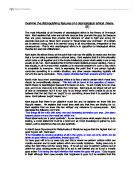Kant maintained that all moral concepts have their origin a priori; they are grounded on truth. Kant established that all moral law statements are priori synthetic meaning that humans know what is right but may not necessarily be true. Kant thought the principles that underpin all moral decision-making were inherent in the universe. He said that morals are not metaphysical (beyond our experience/universe) they are within our experience/universe. Kant did not believe that morality should be founded upon natural theology, as he believed that you could not base moral laws on something that you cannot prove to exist – God. However, he thought that God’s existence was a postulate of practical reason. Effectively Kant thought that on the basis of morality, God’s existence could be arrived at as a necessary postulate of a just universe, however this is not to say that Kant thought God’s existence could be proved. Individuals should act as if there were a God but this does not mean to say there is a God.
Kant says that the only thing that does not need proving is good will. Good will wills good to occur and therefore the motive is good. Good will can occur by humans using reason to make moral decisions, as reason is the measure of all moral conduct. To achieve the ‘summon bomum’ (the highest from of good) we must assume that human beings are free, because without freedom we cannot make a decision between right and wrong. If we are not free than we are not moral agents.
Kant distinguishes between two imperatives or commands under which human beings act:
- Hypothetical Imperatives are moral judgements based on ‘if.’ We make moral judgments as a means to an end that involves rational thinking. For example ‘if you want good grades, you must revise,’ we can reject the command (revise) if we are willing to reject the ‘if ‘ on which the command rests. Hypothetical imperatives tell us what we ought to do if we want to fulfil our desires.
- Categorical Imperatives are those that should be followed by any fully rational agent. They are ends in themselves and not means to some other end. Anybody with reason will follow the categorical imperative as moral duties are followed because they are duties, and should be followed for being duties alone and not for a means to an end.
Hypothetical imperatives are not moral obligations or duties. Kant observed that these do not depend on one’s wishes or desires. A moral obligation is not ‘if you want something then you ought to do such and such.’ Instead they are categorical i.e. ‘you ought to do such and such’ regardless of your own wishes and desires. Animals have desire and instinct, as do humans. We sometimes act from inclinations but in order to achieve summon bomum we need to use reason to make moral decisions not inclinations. To achieve summon bomum we must not have any self interest when making judgments.
Although there is only one categorical imperative, Kant argued that this principle can be formulated in three different ways:
- The Formula of the Law of Nature: Act as if the maxim of your action were become through your will a universal law of nature.
- The Formula of the End Itself: Act in such a way that you always treat humanity, whether in your own person or in the person of any other, never simply as a means, but always at the same time as an end.
- The Formula of the Kingdom of Ends: So act as if you were through your maxims a law-making member of a kingdom of ends.
Kant thought that each of these three formulations would produce the same conclusion regarding the morality of any particular action, with no exceptions. Therefore, each of these four ways gives a step-by-step plan in order to determine whether an action is right or wrong.







